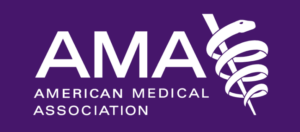
NATIONAL HARBOR, MD — Delegates to the American Medical Association (AMA) met in National Harbor, MD to discuss a wide-ranging list of issues. The event brought together physician and medical student leaders from across the nation to shape guiding policies on emerging health care topics. Over 100 resolutions were considered addressing topics impacting patient care and the profession, and more than 20 educational sessions were offered.
The AMA’s House of Delegates is the policy-making body at the center of American medicine, bringing together an inclusive group of physicians, residents, and medical students representing every state and medical specialty. Working in a democratic process, delegates create a national physician consensus on issues in public health, science, ethics, business, and government to provide safer, better quality, and more efficient health care for patients.
The policies adopted at this meeting by the House of Delegates include:
Removing Physicians from Cost-Sharing Collections
As health insurers require patients to pay a larger share of health care bills, many physicians do not feel comfortable or adequately equipped to be the collection point for cost-sharing between insurers and patients. In response, the AMA has established new policy supporting the removal of physicians from the middle of cost-sharing between insurers and patients and require insurers to collect deductibles, copays or coinsurance from patients.
Delegates voted to adopt policy instructing the AMA to “support requiring health insurers to collect patient cost-sharing and pay physicians their full allowable amount for health care services provided, unless physicians opt-out to collect such cost-sharing on their own.”
“Requiring physicians to engage in the collection of cost-sharing at the point-of-service negatively impacts many physicians,” said AMA Trustee Marilyn J. Heine, M.D. “Alternative methods of collecting cost-sharing that place the onus on insurers can relieve private practices, especially small and rural practices, of significant administrative burdens that divert financial resources and staff away from patient care.”
The AMA’s Recovery Plan for America’s Physicians is working to remove unnecessary and costly burdens so physicians can focus on patients and keep practices open and sustainable.
Opposing encroachment of administrators on medical decision-making
Growth in the number of health care administrators—those with administrative roles such as Chief Medical Officer or Chief Health Officer—has outpaced growth in the number of clinical physicians. Conflicting goals such as the ethical duties of physicians versus the financial obligations of administrators have created tension and disconnect between the two groups. In response, delegates voted to adopt policy instructing the AMA to advocate for resistance against encroachment of administrators upon physician’s medical decision making.
“The large-scale employment of physicians has brought about a change to the profession that has resulted in conflict,” said AMA Trustee David H. Aizuss, M.D. “Traditional physician autonomy in patient care is now being influenced by pressures motivated by cost versus high quality patient care.”
The key concern regarding this change to the profession is that this new organizational and economic reality of medicine will ultimately harm patients as physicians may feel pressured to make decisions based on cost instead of high-quality patient care such as admitting patients from the emergency department who could be treated as outpatients or to discharge Medicare patients ahead of time.
“We must continue to oppose encroachment of administrators upon medical decision making of attending physicians that is not in the best interest of patients,” said Dr. Aizuss.
Calling for increased flexibility for buprenorphine prescribing for opioid use disorder
The nation’s worsening opioid overdose epidemic prompted the AMA House of Delegates today to call for the elimination of dose limit barriers for adequate buprenorphine treatment for patients with opioid use disorder (OUD). Currently, patients and physicians encounter strict dose limits set by health insurance companies and other payers based on drug labels approved by the United States Food and Drug Administration (FDA) decades ago, when illicitly manufactured fentanyl was not a major cause of mortality, as it is today. Buprenorphine reduces the risk of opioid overdose death, eases opioid withdrawal symptoms and cravings, and helps sustain recovery for patients with an OUD.
“Illicitly manufactured fentanyl and other synthetic opioids have created a far more dangerous and deadly epidemic in recent years, claiming more than 109,000 lives in 2022,” said Bobby Mukkamala, M.D., chair of the AMA Substance Use and Pain Care Task Force. “As the drug overdose epidemic evolves, health systems and insurers must adapt. Our colleagues in addiction medicine are seeing efficacy of using buprenorphine products at higher doses than the current FDA-approved labeling, but health insurers and others prevent patients from receiving this medication in a timely manner. Removing these outdated dosage caps will ensure physicians can prescribe life-saving medications without delay.”

The North Carolina delegation included NCMS President Eileen Raynor, MD and past president Arthur Apolinario, MD. Other participating members of the delegation were Delegation Chair Rebecca Hayes, MD, Darlyne Menscer, MD, NCMS Board of Directors Member Karen Smith, MD, Mary Ann Contogiannis, MF, Wake Forest University medical student Alex Soltany, and Royce Syracuse, MD. NCMS CEO Chip Baggett and VP of External Affairs Alan Skipper also attended.
Issues of particular importance noted by North Carolina delegation members include:
- Prevention of imminent payment cuts and ensuring the sustainability of Medicare
Directive of the AMA House of Delegates:
RESOLVED, that our AMA immediately create and disseminate, in major news outlets, a press release outlining the current problems within the Medicare system and how it will affect access to care with a call to action to help those with Medicare keep their physicians and the high-quality care they deserve.
- Strengthening network adequacy
Policy adopted by the AMA House of Delegates
That our American Medical Association (AMA) support establishment and enforcement of a minimum federal network adequacy standard requiring all health plans to contract with sufficient numbers and types of physicians and other providers, including for mental health and substance use disorder, such that both scheduled and unscheduled care may be provided without unreasonable travel or delay.
- Drug shortages
Policy adopted by the AMA House of Delegates
Our AMA opposes the practice of preferring drugs experiencing a in shortage on approved pharmacy formularies when other, similarly effective drugs, in patient-appropriate formulations, are available in adequate supply yet but otherwise excluded from formularies or coverage plans.
Doctor Raynor remarked: “The issues of greatest urgency to our North Carolina colleagues and our patients which were addressed by the AMA House of Delegates were averting the impending cut to Medicare reimbursement; enacting an adjustment in Medicare physician payment to allow for inflation; achieving network adequacy for patients and providers; and prevention of pharmacy formulary limitations that limit patient access to medications.”
The AMA House also addressed resolution on cannabis, medical aid-in-dying, and the corporate practice of medicine staffing emergency departments. The House will convene in June for the 2024 Annual Meeting of the AMA.
